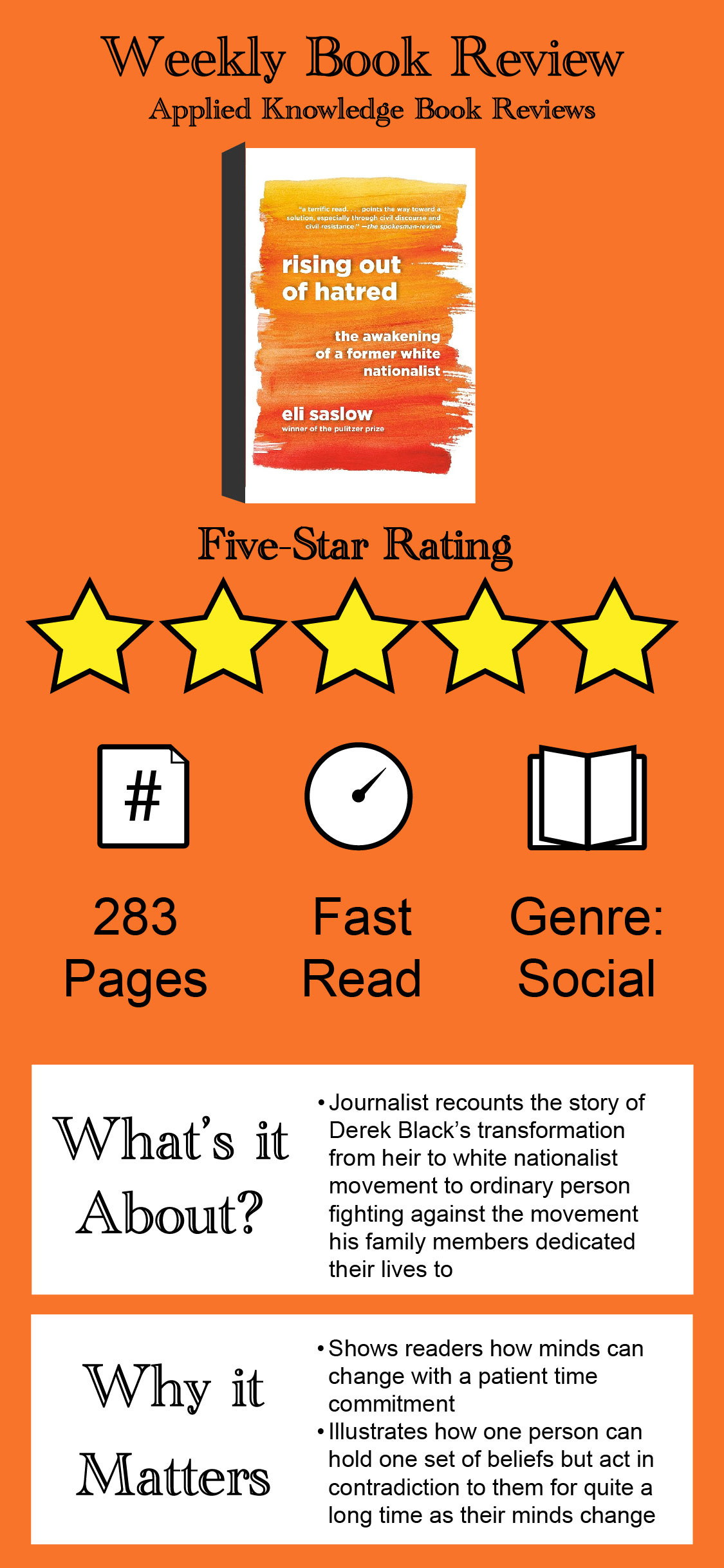How a White Nationalist Changed His Mind
Derek Black was set to inherit the white nationalist movement. Instead, he came to reject the ideology that he was raised on.
In our polarized environment, it’s hard to imagine anyone changing their mind on one issue, let alone an entire worldview. But that’s the kind of transformation Derek Black underwent when he renounced the white nationalist movement and began speaking out against a movement he helped build.
He helped his father, Don Black, found Stormfront, one of the largest hate sites on the internet. Derek’s godfather was David Duke, the grand wizard of the KKK. So, his public disavowal of his social network growing up in 2013 was a remarkable turnaround.
Eli Saslow chronicled Derek’s ideological transformation in Rising Out of Hatred. It’s a quick read that shows a mind changing in real time. It’s a long, slow process, during which Derek’s beliefs remained the same even as his actions contradicted them. Derek’s story is an inspirational story of change and a practical guide to engaging changing minds.
Nonjudgmental Inclusion
Derek’s parents homeschooled him but allowed him to go to college to see what the liberal bastions were really like. He attended New College, a small liberal-arts school that couldn’t have been more different from Derek’s upbringing. Once other students found out who he was, several protested his presence.
One student had a different idea.
Matthew, an Orthodox Jew who hosted weekly Shabbat dinners, invited Derek to these dinners and practiced nonjudgmental inclusion. He wouldn’t interrogate Derek’s white nationalist views as long as Derek didn’t impose them on the group, and Matthew would extend hospitality. A conservative on campus, Matthew was convinced that “There is no better way to make sure Derek keeps these abhorrent views than if we all exclude him.”
Even as Matthew received pushback from students who listened to Derek’s radio show and heard no changes in his views, Matthew kept his dialogue with Derek open.
“The basic principle is that it’s our job to push the rock, not necessarily to move the rock…That’s the only part we can control. Just give it time. We don’t know where it will go, but I think he’s already started softening.”
A Slow Transformation
As the year went on, Derek became closer to Matthew, made new friends, and ended up dating a young woman who had initially protested Derek’s attendance at the weekly Shabbat dinners.
Derek also questioned his beliefs, absorbing the college’s concerns about issues like privilege and hearing different interpretations of facts he had never had to question before. Racial disparities in test performance could be traced to factors like access to tutors and good schools instead of inherent racial differences. By 2013, Derek was ready to repudiate his old worldview and, by extension, his family.
He wrote a letter and sent it to the Southern Poverty Law Center. In one passage, he gave the game of white nationalism away:
“It has become clear to me that white nationalism is not a movement of positive identity or of asserting cultural values, but of constant antagonism at the betterment of other groups. Advocating for white nationalism means that we are opposed to minority attempts to elevate themselves to a position equal to our own.”
Derek had this insight early in his life. He taught his father that “the best way to expand white nationalism was to reinforce feelings of white grievance and victimhood—to pit whites against minorities by hammering home what he saw as the travesties of cultural erosion and white genocide…” Now he was opposing that belief instead of using it to recruit new white nationalists.
Derek’s conversion became national news. As expected, his family disowned him, but he also won the admiration of many New College students who had long opposed his attendance.
Other People Were the Most Important Parts of His Transformation
When the Daily Beast ran a story about Derek’s ideological change, he emailed the reporter a few thoughts about the article. He only had a few criticisms of it:
“People who disagreed with me were critical in this process…Especially those who were my friends regardless, but who let me know when we talked about it that they thought my beliefs were wrong and took the time to provide evidence and civil arguments. I didn’t always agree with their ideas, but I listened to them and they listened to me.”
“Furthermore, a critical juncture was when I realized that a friend was considered an outsider by the philosophy I supported. It’s a huge contradiction to share your summer plans with someone whom you completely respect, only to then realize that your ideology doesn’t consider them a full member of society. I couldn’t resolve that.”
No one is obligated to take a white nationalist under their wing, but few people have the opportunity to do so, anyway. What’s more achievable is remaining in dialogue with people we disagree with, though often not about the actual points of disagreement. Friendship is a stronger foundation to launch a mind-changing campaign from than online keyboard battles.
Maintaining a friendship isn’t a way to make disagreements disappear or compromise one’s values. It’s a way for two people to push on each other’s beliefs and see where they need to grow.
Don’t expect your beliefs to be as one-sidedly correct as Matthew’s or one-sidedly wrong as Derek’s. You probably have rough edges that a good friend can shave off for you.


